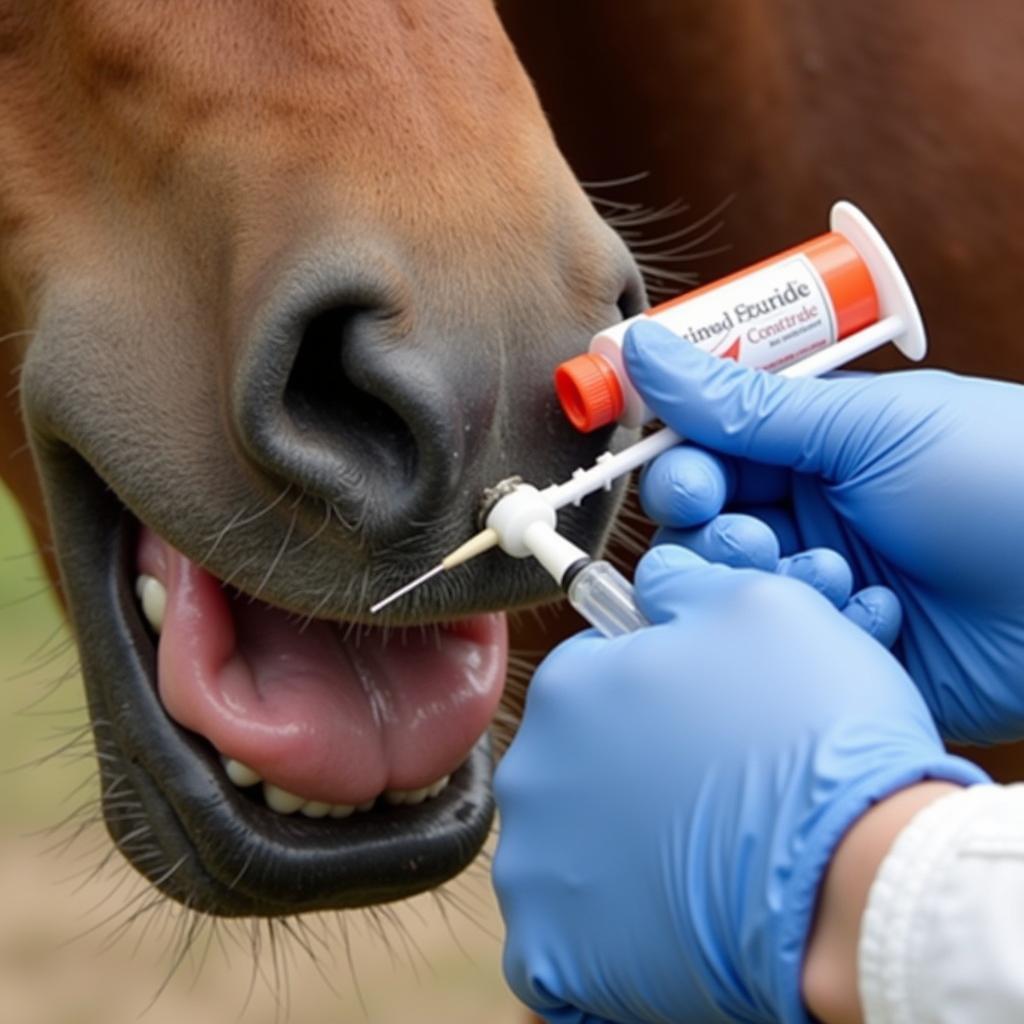Strongid Paste For Horses is a common dewormer used to control specific internal parasites. Understanding its proper use is crucial for maintaining your horse’s health. This guide provides in-depth information on Strongid paste, including its uses, benefits, and potential risks.
What is Strongid Paste for Horses?
Strongid paste, also known by its generic name pyrantel pamoate, is an anthelmintic medication, meaning it’s designed to combat parasitic worms. It’s particularly effective against strongyles, a common type of parasite that can significantly impact a horse’s digestive system. It comes in a convenient paste form, making administration relatively straightforward. Choosing the right dewormer is a key component of responsible horse ownership, and understanding how Strongid fits into your horse’s health plan is essential. For more on choosing the right dewormer, check out our article on strongid horse dewormer.
Strongid works by paralyzing the target parasites, preventing them from feeding and reproducing. This allows the horse’s natural digestive processes to expel the worms. While generally safe and effective, it’s important to consult with a veterinarian to determine the appropriate dosage and frequency for your horse. Different horses have varying needs based on their age, weight, living conditions, and overall health.
 Administering Strongid Paste to a Horse
Administering Strongid Paste to a Horse
Benefits of Using Strongid Paste
Strongid paste offers several advantages for horse owners. Its palatability makes it relatively easy to administer, even to horses that can be picky about medications. It’s also effective against specific types of strongyles that are particularly harmful to horses. Utilizing strongid wormer for horses can be a crucial aspect of a horse’s overall health management.
- Effective against strongyles, including bloodworms
- Easy to administer due to its paste formulation
- Generally safe for horses of all ages, when administered correctly
Understanding the Different Types of Strongid
It’s important to note there are two main types of Strongid: Strongid P and Strongid C. Strongid P contains only pyrantel pamoate, while Strongid C is a combination dewormer that includes pyrantel pamoate and praziquantel. The addition of praziquantel in Strongid C broadens its effectiveness to include tapeworms. Understanding which type of Strongid is appropriate for your horse is crucial.
Potential Risks and Side Effects
While Strongid is generally considered safe, certain side effects can occur, although they are rare. These can include mild digestive upset, such as diarrhea or loss of appetite. In rare cases, allergic reactions can occur, which may manifest as hives, swelling, or difficulty breathing. If you observe any unusual symptoms after administering Strongid, contact your veterinarian immediately. Learn more about different worming pastes in our guide to worming paste horses.
Deworming Schedule and Best Practices
Establishing a regular deworming schedule is essential for managing internal parasites in horses. The frequency and type of dewormer will depend on various factors, including the horse’s age, living environment, and the prevalence of parasites in the area. Consulting with your veterinarian will help you determine the best deworming protocol for your horse. Rotation of dewormers is often recommended to prevent parasite resistance. For more insights, read our article on dewormer rotation for horses.
Why is Deworming Important?
Internal parasites can cause a range of health problems in horses, from mild discomfort to severe illness. Symptoms of parasite infestation can include weight loss, poor coat condition, colic, and diarrhea. Regular deworming helps to prevent these problems and maintain the overall health and well-being of your horse. Proper deworming protocols, including the use of pyrantel for horses, are an integral part of responsible horse ownership.
 A Healthy Horse Grazing in a Pasture
A Healthy Horse Grazing in a Pasture
Conclusion
Strongid paste for horses is a valuable tool in managing internal parasites. Understanding its proper usage and potential risks is essential for responsible horse ownership. Consult with your veterinarian to develop a customized deworming plan that meets your horse’s specific needs, ensuring they remain healthy and thrive. Remember, a proactive approach to parasite control is crucial for the long-term well-being of your equine companion.
FAQ
- How often should I deworm my horse with Strongid?
- What types of worms does Strongid effectively treat?
- Are there any age restrictions for using Strongid paste?
- Can I administer Strongid to a pregnant mare?
- What should I do if my horse experiences side effects after receiving Strongid?
- How do I store Strongid paste correctly?
- Where can I purchase Strongid paste for my horse?
Common Scenarios and Questions
- My horse has lost weight recently; could it be worms?
- I’ve seen worms in my horse’s manure; what should I do?
- My horse seems lethargic and isn’t eating well; could parasites be the cause?
Further Reading and Resources
For more information on horse health and deworming, explore our other articles on related topics. You can find further details on our website regarding specific dewormers and parasite control strategies.
For assistance, contact us at Phone: 0772127271, Email: [email protected] or visit us at QGM2+WX2, Vị Trung, Vị Thuỷ, Hậu Giang, Việt Nam. Our customer service team is available 24/7.